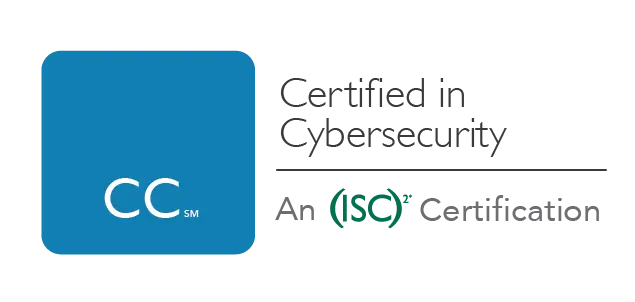ExamPrep ISC2 Cybersecurity
Offline or Online ISC2 Certified in Cybersecurity (CC) ExamPrep training course.
The Certified in Cybersecurity (CC) certification from (ISC)² is a foundational credential for newcomers to the cybersecurity field, validating the core knowledge and skills needed for an entry-level role.
It is suitable for those with no prior experience in cybersecurity, including IT professionals, recent graduates, and career changers.

Manoj S. Mahajan
28+ years Experienced Trainer with 100+ certs, View full profile....Course Description
This entry-level training course covers all the fundamental concepts essential for further studies in cybersecurity and passing the ISC2 Certified in Cybersecurity (CC).
Whether you come from an IT background or not, this certification is accessible to anyone with consistency and a passion for the cyber world.
Audience:
- This course is ideal for IT professionals, network administrators, and anyone pursuing a career in cybersecurity.
- For those aiming to pass the ISC2 Certified in Cybersecurity (CC) certification exam.
Why join our ISC2 ExamPrep training?
- Instructor-led ExamPrep training with ISC2 Certified trainer.
- Hands‑on labs to reinforce theory with practice
- Exam practice questions at the end of each lecture
- Mock exams to prepare for certification success
- Real‑world project simulations for practical experience

ISC2 Certified in Cybersecurity (CC) Exam details:
- Passing score: 700 out of 1000 points
- Number of items: 100
- Format: Multiple choice and advanced items
- Length of exam: 2 hours
Key Features
- Real-time 1 to 1 interaction
- Download short notes
- Get the source code after each lecture
- Get an attendance certificate

Syllabus
Please check the syllabus tab above. ☝- Domain 1. Security Principles (26% Average Weight)
- Domain 2. Business Continuity (BC), Disaster Recovery (DR) & Incident Response Concepts (10% Average Weight)
- Domain 3. Access Controls Concepts (22% Average Weight)
- Domain 4. Network Security (24% Average Weight)
- Domain 5. Security Operations (18% Average Weight)
What You'll Learn in this training (26% Average Weight)
Domain 1: Security Principles
1.1 - Understand the security concepts of information assurance
- Confidentiality
- Integrity
- Availability
- Authentication (e.g., methods of authentication, multi-factor authentication (MFA))
- Non-repudiation
- Privacy
1.2 - Understand the risk management process
- Risk management (e.g., risk priorities, risk tolerance)
- Risk identification, assessment and treatment
1.3 - Understand security controls
- Technical controls
- Administrative controls
- Physical controls
1.4 - Understand ISC2 Code of Ethics
- Professional code of conduct
1.5 - Understand governance processes
- Policies
- Procedures
- Standards
- Regulations and laws
Domain 2: Business Continuity (BC), Disaster Recovery (DR) & Incident Response Concepts
2.1 - Understand business continuity (BC)
- Purpose
- Importance
- Components
2.2 - Understand disaster recovery (DR)
- Purpose
- Importance
- Components
2.3 - Understand incident response
- Purpose
- Importance
- Components
Domain 3: Access Controls Concepts
3.1 - Understand physical access controls
- Physical security controls (e.g., badge systems, gate entry, environmental design)
- Monitoring (e.g., security guards, closed-circuit television (CCTV), alarm systems, logs)
- Authorized versus unauthorized personnel
3.2 - Understand logical access controls
- Principle of least privilege
- Segregation of duties
- Discretionary access control (DAC)
- Mandatory access control (MAC)
- Role-based access control (RBAC)
Domain 4: Network Security
4.1 - Understand computer networking
- Networks (e.g., Open Systems Interconnection (OSI) model, Transmission Control Protocol/Internet Protocol (TCP/IP) model, Internet Protocol version 4 (IPv4), Internet Protocol version 6 (IPv6), WiFi)
- Ports
- Applications
4.2 - Understand network threats and attacks
- Types of threats (e.g., distributed denial-of-service (DDoS), virus, worm, Trojan, man-in-the-middle (MITM), side-channel)
- Identification (e.g., intrusion detection system (IDS), host-based intrusion detection system (HIDS), network intrusion detection system (NIDS))
- Prevention (e.g., antivirus, scans, firewalls, intrusion prevention system (IPS))
4.3 - Understand network security infrastructure
- On-premises (e.g., power, data center/closets, Heating, Ventilation, and Air Conditioning (HVAC), environmental, fire suppression, redundancy, memorandum of understanding (MOU)/memorandum of agreement (MOA))
- Design (e.g., network segmentation (demilitarized zone (DMZ), virtual local area network (VLAN), virtual private network (VPN), micro-segmentation), defense in depth, Network Access Control (NAC) (segmentation for embedded systems, Internet of Things (IoT))
- Cloud (e.g., service-level agreement (SLA), managed service provider (MSP), Software as a Service (SaaS), Infrastructure as a Service (IaaS), Platform as a Service (PaaS), hybrid)
Domain 5: Security Operations
5.1 - Understand data security
- Encryption (e.g., symmetric, asymmetric, hashing)
- Data handling (e.g., destruction, retention, classification, labeling)
- Logging and monitoring security events
5.2 - Understand system hardening
- Configuration management (e.g., baselines, updates, patches)
5.3 - Understand best practice security policies
- Data handling policy
- Password policy
- Acceptable Use Policy (AUP)
- Bring your own device (BYOD) policy
- Change management policy (e.g., documentation, approval, rollback)
- Privacy policy
5.4 - Understand security awareness training
- Purpose/concepts (e.g., social engineering, password protection)
- Importance

Sachin
Training was excellent with good interaction. Knowledge sharing is good. Recording facility is excellent for revising. Course was practically and informative. Manoj Sir is enthusiastic and really aware of what he is explaining. The course helped to build confidence, Valuable experiences and learning. Read more....

Nagesh
I have learn new technology & it is very important for my future life. This institute is best for the IT life. Read more....

Sachin
It was very good experience. Manoj sir's focus on basics helps me to grasp knowledge very quickly and efficiently. Sir not only focused on theory but gave different practicle example which really helpful. I definitely recommend this training to my colleagues. Read more....




